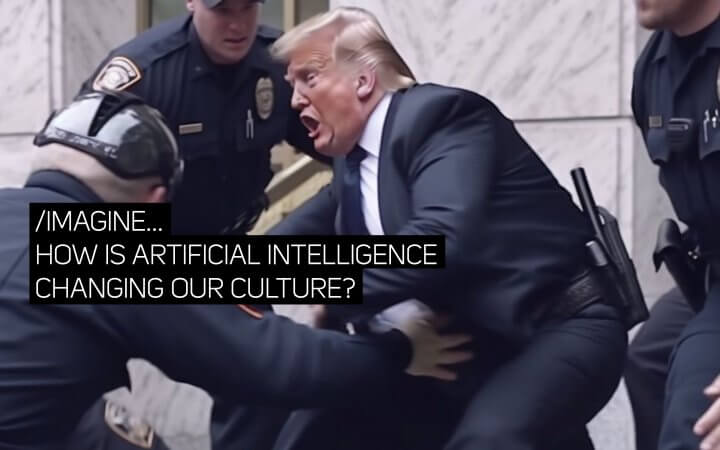/IMAGINE… How is Artificial Intelligence changing our culture?
13.06.2023, 18:30
Please note: All seats in the event room are already fully booked. The event will be broadcast live on the ground floor and on Youtube. You can register for the live broadcast on the ground floor via email to post(at)fkv.de. We will reserve a seat for you there.
Panel Discussion with Ranga Yogeshwar, Boris Eldagsen, Björn Ommer and Franziska Nori
Together with Ranga Yogeshwar, the Frankfurter Kunstverein invites you to an evening event where experts will shed light on the multi-layered consequences of AI image generation, prompting and its implications.
This is the first time that the machine has relied on what has defined humans and their civilisation for millennia: language. It is the basis of our culture, politics, legislation, the financial market and man’s view of himself. The new AI applications are now hacking the human operating system.
With the widespread use of AI technology, society and all areas of human life are facing an epochal transformation. Technology is changing from a passive tool to an autonomously acting system that makes decisions on its own and can create new narratives. Artificial intelligence is thus advancing to become a communication partner (almost) at eye level, which is also predicted to have the potential for emotions and consciousness in the near future.
What is at stake is a fundamental shift in the relationship between humans and synthetic intelligence, in which it is important to clarify according to which influencing factors they behave in each case. Thus, the question arises whether there is a structure-preserving mapping of our reality in the digital world of numbers and correlations. On a deeper level, reality would dissolve in digitality.
If generating technologies deconstruct human reality and artificially reassemble it, what will this new reality look like? What role does language play when machine intelligence transforms it into mathematical models? In what balance of power will decisions be made? And ultimately, it all leads to the fundamental question of what constitutes being human?
Pre-registration via email to post(at)fkv.de. The event is free of charge and will take place in German.
Participants:
Ranga Yogeschwar (*1959) is one of Germany’s leading science journalists. After studying experimental elementary particle physics and astrophysics, he worked at the Swiss Institute for Nuclear Research (SIN), at CERN in Geneva and at the Jülich Research Centre. He has presented numerous TV programmes, including “Kopfball”(ARD), “Quarks&Co”(WDR) and “Die große Show der Naturwunder” (ARD). Yogeshwar regularly contributes to leading newspapers and is a welcome expert on numerous talk shows. His books “Sonst noch Fragen?”, “Ach so!” and “Nächste Ausfahrt Zukunft” quickly became bestsellers and have been translated into numerous languages.
Boris Eldagsen (*1970) is a photographer, promptographer and leading AI expert in the German photo scene. He studied fine arts at the Mainz Art Academy, the Academy of Fine Arts (Prague, CZ) and the Sarojini Naidu School of Arts & Communication (Hyderabad, India). He also studied philosophy at the universities of Cologne and Mainz. In April 2023, he won the Sony World Photography Award for the image PSEUDOMNESIA | The Electrician, which was created using AI image generators. However, he declined the award on the grounds that AI-generated images are not camera-based photography but promptographs. He thus opened an international debate on the possibilities and dangers of artistic work in co-creation with AI. His photographic and video works have been exhibited in numerous international institutions and festivals. Since 2004, he has taught at international universities and art academies and given workshops at museums and universities.
Björn Ommer (*1981) developed the deep-learning text-to-image generator Stable Diffusion. After studying computer science and physics at the University of Bonn and earning his doctorate at ETH Zurich, he worked as a postdoctoral researcher in the computer vision group at the University of California, Berkeley. He was then a professor at the Faculty of Mathematics and Computer Science at the University of Heidelberg. Since 2021, he has been Professor of the newly established Chair of AI for Computer Vision and Digital Humanities/the Arts at the Ludwig Maximilian University of Munich. There he heads the Computer Vision & Learning research group (formerly Computer Vision Group Heidelberg), which conducts basic research in the field of computer vision and machine learning – and their application in the digital humanities in particular.
Franziska Nori (*1968) has been director of the Frankfurter Kunstverein since November 2014, for which she has curated exhibitions with contemporary artists such as Forensic Architecture, Trevor Paglen, Thomas Feuerstein, Melanie Bonajo, Jeremy Shaw, and numerous thematic exhibitions. With a focus on art and science, she has conceived exhibitions on changing human perception in virtual worlds (Perception is Reality – On the Construction of Reality and Virtual Worlds, 2017/2018) or the perspective of learning algorithms and artificial intelligence (How to Make a Paradise – Seduction and Dependence in Generated Worlds, 2020, I am here to learn – On Machinic Interpretation of the World, 2018). From 2007-14 she was director of the Centro di Cultura Contemporanea Strozzina at Palazzo Strozzi in Florence and from 2000-03 she was head of the digital art department at the Museum für Angewandte Kunst in Frankfurt. Nori has been Honorary Professor of Museology and Curatorial Practices of Contemporary Art at Marist University Lorenzo de Medici since 2011.

